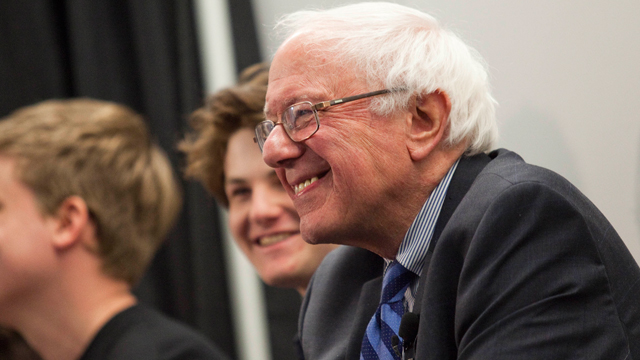This post first appeared at Truthout.

(Photo: StumpSource.org Photo Stream/flickr CC 2.0)
On April 30, Senator Bernie Sanders, the only socialist in Congress, announced his presidential candidacy in the Democratic race. So far, he is the only candidate challenging Hillary Clinton from the left. For immigrant rights activists and organizers, Senator Sanders’ populist agenda provides a new platform to develop an alternative strategy and vision for the movement.
Since 2006, mainstream immigrant rights organizations and legislators have heavily focused on passing some form of comprehensive immigration reform legislation that provides a pathway to citizenship for undocumented immigrants (while further militarizing the border). However, during this process, actual voices and concerns of undocumented immigrants were often lost, if not neglected. Undocumented immigrants’ personal – and sometimes painful – stories were used to garner sympathy for the legislation instead of addressing the root causes of the problem.
More than anything else, the DREAM Act demonstrates the failure of mainstream immigrant rights organizations. Initially, the DREAM Act focused on undocumented youth amid federal failures to move something more comprehensive. The bill soon garnered popularity and gained support from both the Democrats and the Republicans. As the bill’s popularity rose, many undocumented youth adopted the term “DREAMers” to identify themselves.
However, the DREAM Act’s characterization of undocumented youth created dilemmas within the immigrant rights movement. In the words of the Senate Minority Leader Harry Reid, “The DREAM Act will give children brought to this nation by their parents through no fault of their own … the opportunity to gain legal status.” This popular – and now dominant – narrative portrayed many undocumented youth as clueless and innocent children who deserved second chances and their parents as wrongdoers. Moreover, the bill’s requirements – such as four-year college education, military enlistment or the age limit – marginalized thousands who did not meet the criteria.
These internal contradictions could be ignored because the prospect for the immigration reform was so positive, and the legislation created space for a groundswell of undocumented youth to step out of the shadows. At the same time, they severely restricted the energy of the movement. Mainstream organizations and the media tokenized DREAMers as aspiring Americans with remarkable academic achievements. Moreover, many immigrant rights organizations recognized the appeal of DREAMers to wider audiences, and foundations turned them into lucrative funding source. In a way, DREAMers became a commodity for fundraising efforts while perpetuating model minority stereotypes.
The current political paralysis at the federal level exemplifies the immigrant rights movement’s need for an alternative strategy and vision. In 2013, the Senate passed its own immigration bill, concomitant with the explosion of a new electorate sensitive to – or directly impacted by – reform efforts. Still, the GOP-dominated House failed to produce any meaningful legislation – apart from an attempt to repeal the Deferred Action for Childhood Arrivals, a temporary protection for undocumented youth.
Moreover, President Obama, who calls himself “champion in chief” of immigrant rights, continues to tear apart thousands of communities every day. Unless the administration’s draconian deportation policy is stopped, President Obama will deport more than three million people by the time he leaves office. Last November’s executive action, which expanded protections for undocumented people (while further excluding others), resulted from dedicated pressure from immigrant rights activists. Even then, this temporary and insufficient measure is on hold in federal court.
Under these circumstances, the immigrant rights movement needs to build stronger alliances with different social movements to rise together. Senator Sanders’ populist agenda provides the precise opportunity to build pressure against the prevailing political order in all its dysfunction.
With the rise of Clintonian Democrats in the ’90s, the party effectively abandoned its working-class base – while continuing to provide an illusion of functioning democracy, with an increasingly reactionary opposition party. As Noam Chomsky once said:
The US is still a one-party state, the business party. But it only has one faction: moderate Republicans, now called New Democrats (as the US Congressional coalition styles itself). There is still a Republican organization, but it long ago abandoned any pretense of being a normal parliamentary party.
Senator Sanders’ populist platform directly tackles the public’s despair with the current system. Sanders’ agenda focuses on the ordinary people who have lost their voice in the political discourse. His policy agenda includes public investment, a living wage, equal pay for women and a single-payer health-care system. Now, he is proving his willingness to challenge the oligarchs controlling the political system. As he described the implications of this agenda to the Associated Press, “I’ve run outside of the two-party system, defeating Democrats and Republicans, taking on big-money candidates, and, you know, I think the message that has resonated in Vermont is a message that can resonate all over this country.”
Bernie Sanders himself declared that he entered the race to win, and he will lead a “Political Revolution” for working families. Then, his agenda further expanded to protect all working families including immigrant families. Senator Sanders and his staff must articulate their vision for immigrant families who are vulnerable under the system. Their plan should challenge the root causes of migration and protect all undocumented immigrants. His immigration agenda should include:
- Stop the deportation machine separating families
- End the 34,000 bed mandates
- End the 287(g) program racially profiling immigrants and people of color
- Defund the overblown and ineffective Department of Homeland Security
- Incorporate voices of undocumented immigrants who are directly impacted by the policy
- Broaden the protections for undocumented LGBTQ communities
- Provide much needed help for unaccompanied children who fled the extreme violence and poverty.
- Expand health-care coverage for undocumented immigrants who are excluded from the Affordable Care Act.
Lastly, the immigrant rights movement must step onto this populist platform and demonstrate how the rigged system fails to address issues people actually care about. Immigrant rights activists and organizers must show how the suffering of undocumented immigrants resonates with others who are marginalized by the unjust and unequal system. We need to show solidarity and build alliances with social movements that are also seeking genuine change instead of relying on Hillary Clinton and the hopeless Democratic Party.
The views expressed in this post are the author’s alone, and presented here to offer a variety of perspectives to our readers.
Copyright, Truthout.org. Reprinted with permission.


